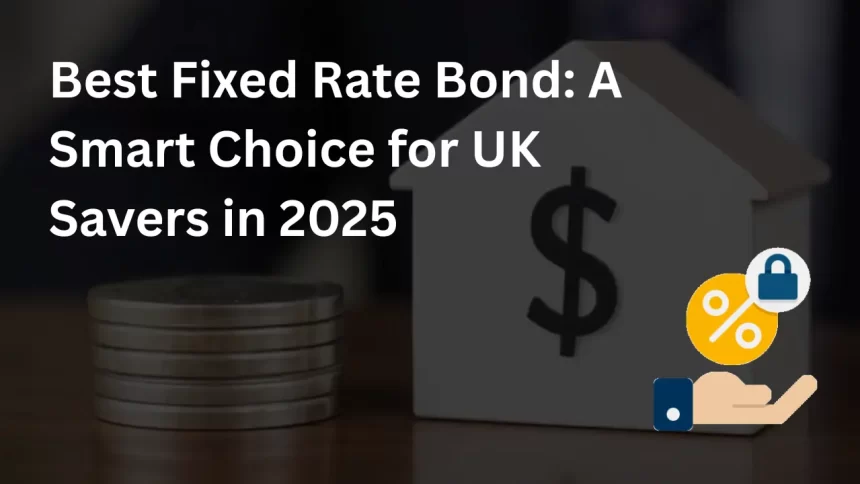Looking to grow your savings with a safe, predictable return? Best Fixed rate bonds in the UK can offer a reliable option for savers seeking guaranteed interest over a set term. In a climate of economic uncertainty and fluctuating interest rates, locking in a fixed return can give peace of mind—particularly for those nearing retirement or saving for a short- to medium-term goal. In this guide, we’ll walk you through everything you need to know about the best fixed rate bonds available in 2025, how they work, and whether they’re the right option for you.
💡 Pro Tip: Compare bonds across different tenures like 1-year, 2-year, and 5-year options to find what suits your financial goals best.
📩 Want the best savings tips sent to your inbox? Subscribe to our newsletter and never miss a money-saving update!
What Is a Fixed Rate Bond?
A fixed rate bond is a type of savings account where your money is locked away for a set period—usually between 1 to 5 years—and earns a guaranteed interest rate. Unlike variable rate accounts, where interest can fluctuate, fixed bonds offer certainty and stability.
Key UK-Specific Features:
- Offered by UK banks and building societies
- FSCS protection up to £85,000 per institution
- Usually no access to funds during the term
- Interest can be paid annually or at maturity
This makes them appealing to cautious savers looking for predictable returns, especially when interest rates are attractive compared to easy access accounts.
How Do Fixed Rate Bonds Work in the UK?
Step-by-Step Breakdown:
- Choose your bond: Select a provider and term (e.g., 2-year fixed rate bond at 5.25% AER).
- Deposit funds: Usually, you deposit a lump sum. Minimum amounts typically range from £500 to £5,000.
- Lock-in: You agree not to withdraw the money until the term ends.
- Earn interest: This is calculated based on the fixed rate and paid at set intervals.
- Maturity: At the end of the term, your capital and accrued interest are returned.
Example Scenario:
Sarah invests £10,000 in a 3-year fixed rate bond at 4.8% AER.
- After Year 1: £480 interest earned
- Year 2: Additional £480
- Year 3: Additional £480
- Total return: £1440 (before tax)
Types of Fixed Rate Bond Tenures
To help readers find the right fit for their financial needs, here are the common fixed rate bond durations available in the UK:
1-Year Best Fixed Rate Bonds
- Ideal for short-term savers or those waiting for interest rates to rise.
- Flexibility to re-evaluate annually.
2-Year Fixed Rate Bonds
- Balance between return and access.
- Good for medium-term goals like a car purchase or wedding fund.
3-Year Fixed Rate Bonds
- Higher interest rates than shorter terms.
- Best for savers who don’t need access for a while.
5-Year Fixed Rate Bonds
- Maximise interest but commit long-term.
- Best for financial stability and long-term savings plans.
🔗 Coming Soon: Compare top 1-year fixed bonds, 2-year bonds, 3-year options, and 5-year best rates with our in-depth guides.
Pros and Cons
| Pros | Cons |
|---|---|
| Guaranteed returns | No access to funds during term |
| Often higher interest than easy access accounts | Early withdrawal penalties may apply |
| FSCS protection up to £85,000 | Inflation may erode real value |
| Simple and low-risk | Interest rate is fixed, even if base rates rise |
Who Should Consider a Fixed Rate Bond?
Fixed rate bonds can suit various savers, but they’re not for everyone. Here are some ideal candidates:
- Retirees seeking safe returns without daily market volatility
- Students saving gap year funds for the future
- First-time buyers parking house deposit money short-term
- Cautious investors who want stability over speculation
- Parents saving for a child’s education in a few years
However, if you might need emergency access to your money, you’re better off with an easy-access or notice account.
💰 Money-Saving Tip: Always ladder your savings. Split your investment across different bond terms so you get access to part of your money every year.
UK Tax Implications
Interest from fixed rate bonds is subject to UK income tax. Here’s what you need to know:
- Personal Savings Allowance (PSA):
- Basic rate taxpayers: £1,000 tax-free interest
- Higher rate: £500
- Additional rate: No allowance
- Tax-free options: Look for Fixed Rate Cash ISAs, which let you earn interest tax-free (subject to the annual ISA limit, £20,000 for 2024/25).
- HMRC requires you to declare interest earnings if they exceed your PSA.
Tip: Always check whether interest is paid annually or rolled up until maturity—this can affect when it becomes taxable.
FAQ: People Also Ask
Q: Are fixed rate bonds protected by FSCS?
A: Yes. If held with a UK-authorised bank or building society, your money is protected up to £85,000 under the Financial Services Compensation Scheme.
Q: Can I exit a fixed rate bond early?
A: Usually no. Some providers allow it, but expect penalties such as lost interest. Read the terms carefully.
Q: Is interest paid monthly or at maturity?
A: It depends. Some accounts offer monthly interest (useful for income), others at the end. Check the provider’s options.
Q: Are fixed rate bonds better than ISAs?
A: Not always. ISAs offer tax-free interest, but fixed bonds may have higher rates. Compare based on your tax status.
Q: Do fixed rate bonds affect my credit score?
A: No. They are not credit products and have no impact on your credit history.
Q: Can I hold more than one fixed rate bond?
A: Yes. Just be mindful of the £85,000 FSCS limit per institution.
Alternatives and Comparisons
If you’re unsure about locking your money away, consider these alternatives:
Notice Savings Accounts
- Offer better access (e.g., 90-day notice)
- Variable interest rates
- Suitable if you might need funds soon
Easy Access ISAs
- Tax-free savings
- Flexible deposits and withdrawals
- Typically lower rates
Premium Bonds (NS&I)
- Chance to win tax-free prizes instead of interest
- 100% backed by HM Treasury
- No guaranteed return
Compare this with: Top Easy Access Accounts in the UK]or Best Cash ISAs in 2025
Final Thoughts
Fixed rate bonds can be a smart, low-risk way to grow your savings if you don’t need instant access to your money. They’re especially appealing when interest rates are competitive, and they provide a sense of financial certainty in an uncertain world.
Before committing:
- Compare rates and terms across providers
- Consider whether a Fixed Rate Cash ISA is better for your tax situation
- Think about liquidity needs and emergency savings
✅ Take Action: Start comparing the top UK fixed bonds today and see how your money could grow!
You may also be interested in: [Guide to Building an Emergency Fund] or [Fixed Rate ISAs Explained]
Disclaimer
Disclaimer: This article is for general information purposes only and does not constitute financial advice. Please speak to a qualified financial adviser or contact your bank or building society before making investment decisions. Information is accurate at the time of writing and relevant to UK readers only.



